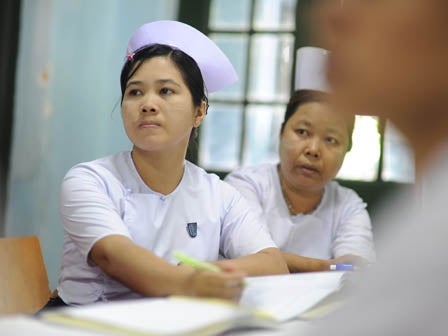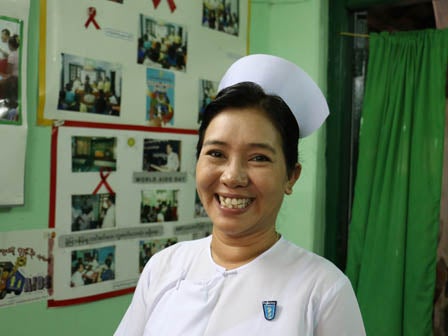KYEEMYINDINE TOWNSHIP, Yangon — Hundreds of health workers throughout Myanmar are being instructed in HIV counselling and testing, under an innovative decentralized training programme organized by UNFPA, the United Nations Population Fund, in collaboration with the National AIDS Programme. This is adding to the range of clinical skills that midwives can perform, thereby speeding up access to services.
Training sessions are being conducted in May and June in 34 townships across seven states and regions. Some 1,500 midwives and health assistants from rural health centres are being trained.
In this impoverished township, across the Hlaing River from urban Yangon, two rural health centres with a staff of nine midwives and two health assistants serve a population of 100,000 people. Khin Mya Aye, a midwife at the U Mya sub-centre, says the training she received will make a big difference in the care she provides for her community:

“Previously, when we gave blood tests to pregnant mothers during antenatal visits, we had to send the samples to the laboratory at the township hospital. In the training we learned how to use a blood testing kit. Now that we can carry out the process by ourselves at the sub-centre, pregnant women suspected of contracting HIV no longer have to take a boat to the other side of the river for further testing and counselling, a costly trip that is especially difficult during the rainy season.”
HIV testing during pregnancy is a vital opportunity for the preventing of mother-to-child transmission (PMTCT) of HIV. Testing is also crucial to providing access to early treatment and care for people who are HIV positive and to protecting those who are HIV negative.

“Although we have provided advice on family planning, these mothers are pregnant again,” she says. “I have given them another blood test and referred them to the nearest hospital, where they can get ART.”
The National AIDS Programme’s PMCT project provides ART to HIV-positive pregnant women in 250 township hospitals, with the support of UNFPA, UNICEF and the Global Fund to Fight AIDS, Tuberculosis and Malaria.
“When we can do the blood test in the clinic we can attend to more patients, and it will benefit them a lot as well,” Khin Mya Aye adds. “As we help mothers deliver their babies, we can provide extra care for HIV-positive patients and even for the patients who are not positive. We can also test for sexually transmitted diseases. For the HIV patients, we can give counselling sessions and refer them to a facility where they can get medical assistance to deliver their babies safely.”
UNFPA has ordered 70,000 test kits, which will be distributed to community health workers like Khin Mya Aye after they have been trained. The Fund is also providing other materials such as gloves and the masks for the HIV prevention programme, notes Dr. Aung Thu Tun of UNFPA Myanmar.


